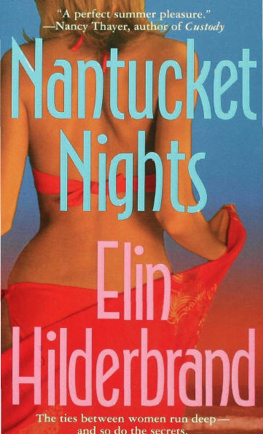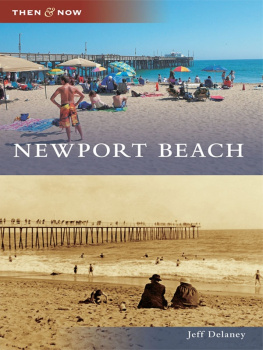May 1
Dear Bill,
Another summer season is about to begin on beautiful Nantucket Island. I have just returned from my winter retreatNevis, Vail, Saipanits your guess where Ive been. The important thing is that Im back, and I am prepared to sweeten my offer to buy the hotel. I know you have some crazy idea about family loyalty and passing the business on to your daughter, but things dont always work out the way we want them to. Alas, I have learned this the hard way. So as you start this season of sun and sand, consider my offer: twenty-two million. Thats a pretty good deal, and if you dont mind my saying so, youre not getting any younger .
Feel free to write to me at the usual P.O. box downtown. Ill be waiting to hear from you .
As ever ,
S.B.T.
On the first of May, Mack Petersen swung his Jeep into the parking lot of the Nantucket Beach Club and Hotel for the start of his twelfth summer season as manager, the Almost Head Honcho. Twelve was an important number, Mack decided, with its own name. A dozen. Macks dozen years of working at the hotel were like eggs, all in one basket, like the Boston cream doughnuts served at the hotels Continental breakfast, one practically indistinguishable from the next. There were twelve months in a year, twelve signs in the Zodiac, twelve hours of A.M. and P.M. Twelve was a full cycle, a cycle completed. Maybe Maribel was right, then. Maybe this was the year things would change.
Mack walked across the parking lot to look at Nantuckets most picturesque beach. Over the winter, northeasterly winds blew the sand into smooth, rounded dunes, in some places six and eight feet high. Mack trudged to the top of one of the dunes and gazed out over the water. The Beach Club sat on the north shore of the island, on Nantucket Sound, where the water was as flat and placid as a fishing pond. The white sand was clean and wide, although they lost beach to erosion, some years as much as twenty-five feet. Last year they had gained beach and the owner of the hotel, Bill Elliott, was so happy that he had thrown his arm around Macks shoulder, and said, See there? Were not going to lose her after all. As though the Beach Club and Hotel belonged to them both. Which, of course, was not the case.
Mack had stayed on Nantucket through the winter with his girlfriend Maribel, but he hadnt checked on the hotel even once. It was a rule hed created over the years: I wont think about the hotel in winter . Were the shingles falling off? Was the paint peeling? Were they losing beach? Those were questions for Bill and his wife, Therese, but they spent their winters skiing in Aspen, and if anyone were going to check on the place, it would be Mack. But he never did. He knew that if he let it, the hotel would obsess him, drive him crazy.
The most photographed part of the hotel was the paviliona covered deck with five blue Adirondack chairs facing the water. All summer, guests sat in the low, wide chairs with their feet up on the railing, drinking coffee, reading the paper. This picture of summer bliss made it into the Nantucket chamber of commerce guide year after year.
The lobby of the hotel was its own freestanding building with a row of windows that looked over the pavilion and the beach. The hotel rooms began outside the back door of the lobby: twenty single-story, cedar-shingled rooms formed a giant L. Ten rooms ran down toward the water and ten rooms faced the water. All the rooms had small decks, and thus the rooms were distinguished by the names, side deck and front deck. Therese had further nicknamed the front deck rooms the Gold Coast, because they were so expensive.
Twenty rooms might not seem like a lot at first, but the beach also hosted a private Beach Club: One hundred members paid annual dues to sit under umbrellas for the ten weeks of summer. They could have saved themselves the money and gone to Steps Beach to the west, or Jetties Beach to the east, but year after year membership of the Beach Club was full. Macks primary job was to treat the guests and the Beach Club members like royalty. He arranged dinner reservations and the delivery of flowers, wine, steamed lobsters, birthday cakes. He had a key to every door, and knew the location of every extension cord, vacuum cleaner bag, feather pillow. He hired and fired the staff and created the weekly work schedule. He knew every Beach Club members name by heart and the names of all the children. Mack ran the place. Bill and Therese had owned the Beach Club and Hotel for twenty years but Mack understood its ins and outs, its cracks, sore spots, and hideaways better than anyone. It had been his course of study now for twelve years.
A thousand guests would walk into the lobby over the next six months. Some had been coming to the hotel as long as Mack had worked there. The baseball managers (in July, over the all-star break), Leo Hearn, a lawyer from Chicago (Memorial Day), Mrs. Ford, a widow who came for the month of September and smoked a pack of cigarettes in her room each day.
Then there would be Andrea Krane, a woman Mack thought he might be in love with. Andrea arrived in June and stayed for three weeks with her autistic son, James. Mack imagined her long, honey-colored hair twisted into a bun or a braid. Smiling a rare smile, because when she arrived at the Beach Club she was happy. She had three weeks stretched in front of her, twenty-one days sparkling like diamonds on a tennis bracelet.
Mack watched the ferry approach in the distance. It was full of people coming to work for the seasonwaiters and waitresses, ice cream scoopers, lifeguards, landscapers, nannies, chambermaids, bellmen. Twelve years ago it had been Mack on that boathis first time on the oceanand when he stepped off at Steamship Wharf his life changed. Nantucket had saved him.
Twelve years ago, Mack was eighteen, a farm boy. Born and raised in Swisher, Iowa, where his father owned a 530-acre farmcorn and soybeans, hogs and chickens. The farm had originally belonged to Macks grandfather, then his father, and Mack grew up understanding that it would one day be his. School felt like a waste of time, except that it was a place to socialize. Mack loved to talkthe bonus for spending hours on a combine by himself was that his father took him to The Alibi for a greasy ham-and-egg breakfast, or to the feed storeand there was always lots of talk.
Macks mother worked part-time at an antique store in Swishera quiet job of crystal figurines and classical music. Macks parents belonged to Swisher Presbyterian, but they werent strict about going to church, nor were they prescriptive about what Mack should believe. In fact, his mother once told him she didnt believe in heaven.













